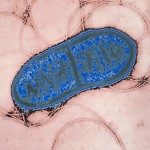Lien vers Pubmed [PMID] – 20628355
Lien DOI – 10.1038/emboj.2010.151
EMBO J 2010 Aug; 29(15): 2623-34
By mobilizing small DNA units, integrons have a major function in the dissemination of antibiotic resistance among bacteria. The acquisition of gene cassettes occurs by recombination between the attI and attC sites catalysed by the IntI1 integron integrase. These recombination reactions use an unconventional mechanism involving a folded single-stranded attC site. We show that cellular bacterial processes delivering ssDNA, such as conjugation and replication, favour proper folding of the attC site. By developing a very sensitive in vivo assay, we also provide evidence that attC sites can recombine as cruciform structures by extrusion from double-stranded DNA. Moreover, we show an influence of DNA superhelicity on attC site extrusion in vitro and in vivo. We show that the proper folding of the attC site depends on both the propensity to form non-recombinogenic structures and the length of their variable terminal structures. These results draw the network of cell processes that regulate integron recombination.



